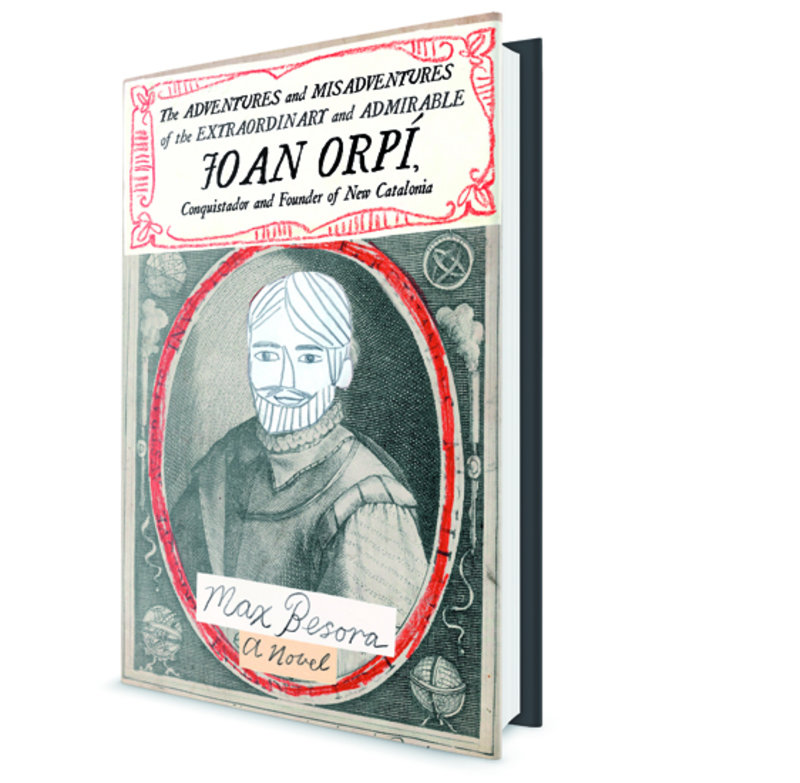The dream of freedom
There is an objection (or is it, attraction?) to this book: it is obsessively scatalogical. Max Besora does not seem to have quite grown out of fascination with reciting ’caca, piss, shit’. His hero Joan Orpí’s birth is described in bracing detail of blood and excrement
In the first chapters of The Adventures and Misadventures of the Extraordinary and Admirable Joan Orpí, Conquistador and Founder of New Catalonia, the young Orpí is stripped and covered with shit by bandits, witnesses witches dancing naked and licking each other’s anuses and watches crowds hurling excrement at a highwayman on his way to execution. When he finally reaches Barcelona from Piera, his birth-place, students paint obscene drawings on walls and smear feces on the dean’s door. But then (relief!) the tone of this picaresque novel changes: the caca, piss, shit episodes fade away as Orpí himself grows up. This change of register is just one in the wild variety of genres, characters and events throughout Besora’s portmanteau of a novel.
Harping on Gender
Orpí is a holy innocent. Robbed, stripped, beaten, starving, betrayed, arrested, even descending briefly into Hell, he comes up smiling. “His face is banana-shaped” – his father thinks he is retarded; but his eyes “don’t miss a beat” (p30).
Orpí’s adventures from cradle to grave are set in the 16th century and Besora invents words and twists known words in a sort of fabricated, but convincing mediaeval idiom. It is a nightmare, or fun perhaps, to translate, and Mara Faye Lethem lets herself rip, triumphantly, with as much skill and brio as the author.
This faux-antiquated dialogue is successful because it is easily understandable, it makes readers who relish words laugh and has a devilish rhythm:
… said the dwarf. “Furthermore, I may be short, but from where I doth stand thou art ugly as a toade and thine breath stinketh most foul.” (p.64)
Or
“Damn tinkers! They hath bilked us!” bawled our hero. “But unaccountably they forsooke our ducats and took merely our shoes… what bizarre folk!” (p.140)
As well as composing this vigorous, musical dialogue, Besora combines erudite and colloquial language outrageously and is gloriously unconcerned about any consistency of time and place. Thus, an illiterate prostitute opines on the psychological roots of impotence. When Orpí meets his travelling companion-to-be Martulina, he perceives that this person dressed as a man is a woman. He tells her so and 17th-century Martulina replies with the mind of a 21st-century feminist:
“Harping on gender again, art we?... I suppose thee bethinks I doth belonge at home, washing clothes and cooking for mine own husband, tis that it?... Mine lyfe is far remov’d from traditional patriarchal roles…” (p.123)
It is a pleasurable, comic, happy book, which is no impediment to its dealing with the most serious subjects. Orpí qualifies as a lawyer. He is prone to delivering lengthy, legal speeches, but fancy words have scant effect on the powerful and the unscrupulous. He leaves Barcelona for Sevilla. Robbed, betrayed, penniless, he then sails for the New World to look for treasure. Each time he is about to be killed, he is calmly philosophical. Through numerous adventures he rises in status and, a conquistador, founds a colony: New Catalonia.
The Adventures and Misadventures revels in often anachronistic meetings with the famous: Cervantes, the pirates Drake and Morgan, the Devil himself (hot and smelly), Serrallonga the bandit, the King of Spain. Orpí tells Serrallonga to look for a proper job or he’ll be hanged (he was). The King grants Orpí control over his lands, but refuses him cash and demands taxes, for:
“We hath no ducath in our cofferth, our debthth to German bankth art tremendouth, and profit from the Americath, diminithing.” (p.297)
As well as the famous, along the way Orpí meets a series of companions in misadventure. Feminist fighter Martulina becomes an Amazon warrior in the jungle. Triboulet the dwarf with nine lives escapes every trap. Araypuro, ’injun’ mystic, accompanies Orpí through thick and thin whilst constantly rebuking him. The intellectual Father Claver prefers books to conquest. Black Estebanico is freed and joins a band of escaped slaves.
New Catalonia crushed
This list of Joan Orpí’s friends makes clear the anti-imperialist politics at the heart of Besora’s picaresque novel. Besora satirises sexism, racism and imperialism. Black people, Native Americans, women, a dwarf, all these oppressed groups fight to free themselves from the all-conquering Castilians. Orpí, the Catalan, has to disguise his Catalan-ness in order to survive among the barbarians. Then he founds New Barcelona and New Catalonia, where the official language is Catalan. The new country in this new world becomes a refuge for all those fleeing the Spanish king’s armies.
Besora’s novel races along, giving readers little time to reflect. At the end, though, you think, whilst knowing that the movement of history entails conquest and exploitation, how history could have been otherwise: less bloody. But of course the new world, despite the best efforts of Orpí and his friends, is a repetition of the old. New Catalonia is crushed by the armies of Felipe IV, but not before Araypuro sings the praises of Orpí’s dream of freedom:
“Not Catholics, not Baptists, not passive, not addictive... very active. Cuz it don’t matter if you’re black, Indian, white or yellow polkadot. We all be together on mine piano keyboard here in this macroterritory, therehence we musteth live in peace and harmony.” (p.355)
In one last fierce conceit, the whole story of Joan Orpí is told by a Captain to his soldiers in an abandoned theatre in Barcelona on the night of September 10, 1714, when “Death hangs gloomily over everyone, scythe at the ready” (p.3). As the story ends and dawn breaks among the shells and screams, the Captain and his soldiers flee the armies of Felipe V for an imaginary New Catalonia. “I had rather be a living deserter than a dead patriot,” muses a soldier (p.3). The novel is an explosion of linguistic freedom, of story-telling as sheer pleasure and of laughter in the face of disaster. And it casts a plague on all patriotisms.
book review
Bastardising the language
Max Besora was born in 1980. His first publications were poems (L’espectre electromagnètic, 2008). Four novels have followed: Vulcano (2011), La tècnica meravellosa (2014), the Joan Orpí reviewed here, which won the City of Barcelona Prize for Best Novel of 2018, and La musa fingida (2020).
Critic Julià Guillamon called Besora an “intellectual hooligan” for his efforts to ’normalise’ Catalan by writing in all kinds of registers, inventing words, breaking with orthodox language. He is able to pursue this new normalisation, as he stands on the shoulders of the 1980s recovery and normalisation of the Catalan language. In his day job, Besora himself teaches the normalised Catalan, but for a writer this is not real. Besora’s punk pleasure is to mix and bastardise the language, which, he avers, “is how to escape all the ideologies embedded in a language.”




